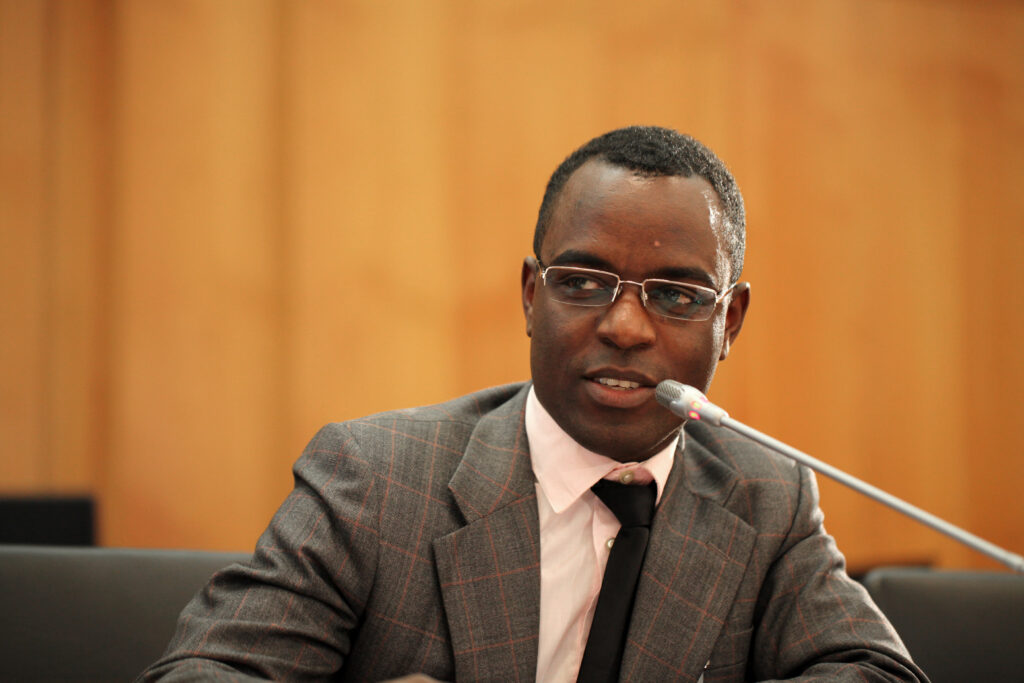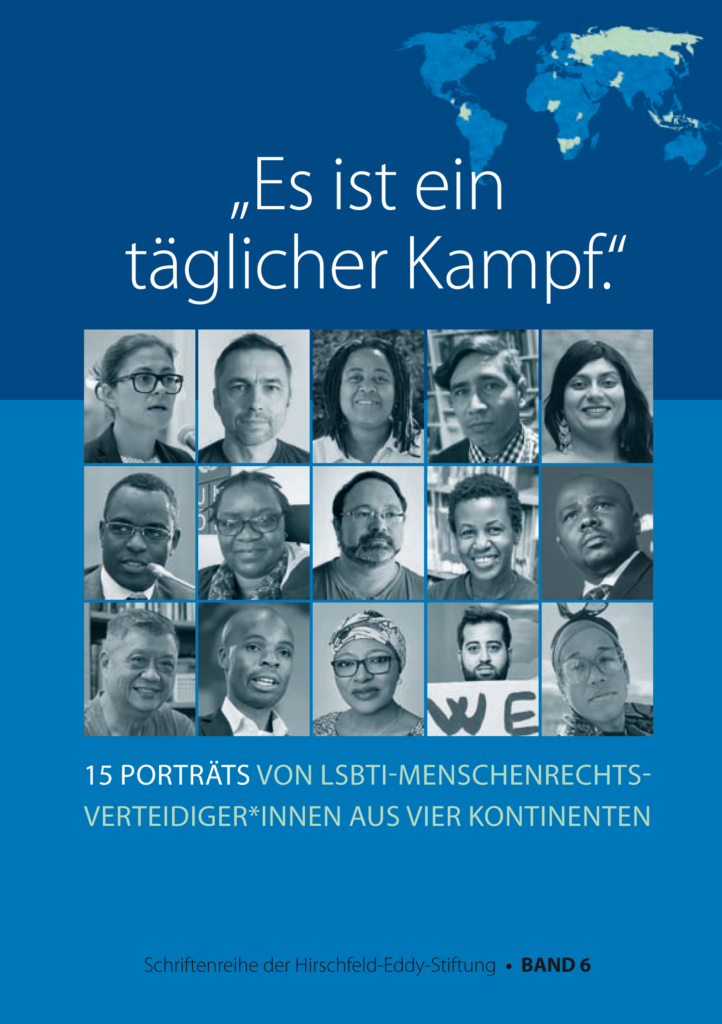Dr. Frank Mugisha (38) is a human rights activist from Uganda and Executive Director of Sexual Minorities Uganda (SMUG) which works for the rights of LGBTIQ+ people. He was born and grew up in Kampala, and was raised a Christian.
Translated from Hirschfeld Eddy Foundation series volume 6 “15 Portraits of LGBTIQ+ human rights defenders” (2021): download or order free of charge (in German) here.
“I love to read and write. I started feeling the power of saying what I think.” Frank Mugisha began his activism by writing, and has since used writing to counter homophobia in Uganda. “I’ve written articles and expressed myself as a gay man and described how I feel,” he says. He started by posting anonymously to a number of blogs, and no one knew who was behind them. “I wrote, and then I contacted people and encouraged them to come out, and told them they could use my method.” His method consisted of mentioning homosexuality casually in a conversation to find out what the other person thought of it.
When people went looking for LGBTIQ+ contacts back then, they usually met secretly in places they wouldn’t be recognized. “They wore hats or caps so as not to show their faces,” he says. “They didn’t give their names or phone numbers, and some even used throwaway cell phones for a single meeting.” They often thought they had made a friend, only never to see the other person again. Then they went back into the closet. “We used to say we had ‘ghost friends’,” Mugisha remarks with a laugh. But then quickly becomes serious. “It was more a form of survival. Every time I went out I wondered how I could advance this movement for LGBTIQ+ rights, how I could improve our lives, how things could become better for us.”
In the early 2000s Mugisha and some of his gay friends launched a social group called the Icebreakers. It began with a few friends who met somewhere safe every week, and talked, cooked and simply had a good time together. Later, in 2004, it became an official association primarily for gay men. Shortly thereafter another group contacted the Icebreakers, namely Sexual Minorities Uganda (SMUG). As Mugisha recalls, “They came to us and said, ‘Why don’t you join us?’ Some of my colleagues of course said, ‘No, that would be too political, we’d be exposed, and everyone would know about us’.” But after some thought, Mugisha found it a good idea because he believed in the power of group action. A short time later, in 2007, he became the executive director of SMUG (sexualminoritiesuganda.com).
At SMUG Mugisha actively worked to combat prejudice faced by gay men, lesbians, bisexuals, trans and intersex people in Uganda. “When you out yourself in Uganda, you’re in danger of being killed, or being lynched by a mob or maybe your own family – of being eliminated by society.” Prison is also a possibility, although the law says the police have to prove same-sex relations. “But if it’s a matter of intimidation, aggression and abuse of the law, they can arrest you and put you in prison. You can lose your job, be kicked out of school, or be rejected by your friends who won’t speak with you anymore.”
“Let us live in peace!” campaign
Mugisha set to work changing that with SMUG. In 2007, soon after he joined, the group developed a campaign. “It was called ‘Let us live in peace’. And it was the very first day that Ugandans woke up and heard LGBTIQ+ people on the radio and saw them on television and in the papers,” he says. “We held a press conference and said we wanted to live in peace. We covered our faces with masks, of course. The masks were supposed to symbolize that we could be anyone – your son, brother, uncle, father, doctor, teacher, really anyone. And the message was that we simply wanted to live in peace, like everyone else in Uganda.”
What came next caught the young activists by surprise. “It was horrible,” says Mugisha. “Worse than we could have imagined.” Many people were arrested or kicked out of their homes, and many were outed. “The papers outed people by printing their addresses or personal information. People lost their jobs and their families – all kinds of things happened.”
The media used blackmail to get information about sexual orientation. The usual method was to send someone pretending to be gay to a date in the community. “And they went to the person and said if you don’t give us 20 or 30 names we’ll expose you. That’s how they blackmailed people, who usually supplied the names. And then were exposed anyway.” This was the mechanism behind the system of blackmailing and outing.
Mugisha didn’t see any way out of the situation, so joined others in exile in Kenya. He preferred to stay in his home country and was the last to leave. The situation in Uganda remained horrendous. “The government and police declared open season on LGBTIQ+ people and many were arrested and tortured,” he says. “I remember going to the airport with nothing but my passport. I had my passport in my pocket at that time whenever I went out.”
In Nairobi the activists were assisted by local defenders of human rights. “The Kenyan activists and LGBTIQ+ groups were a big help to us,” he recalls. “They made space available to us so we could work.” The activists stayed in Kenya for two months and then returned to Uganda when the persecution subsided. “I knew it was only temporary, and that I’d return. This is my home. I want to change things here in Uganda and continue my work!”
“My greatest success? I’m no longer afraid.”
After the activists returned to Uganda there were some improvements to the laws. For example, the “Anti-Homosexuality Act” of 2009 was declared null and void by the country’s constitutional court in 2014 – on procedural grounds. Mugisha was one of the petitioners who challenged the law in court. However, there is currently a new draft law, which activists are working hard to prevent. “I’m convinced we’ll get rid of this law too, or that the president won’t sign it. The legal situation has changed,” is his hopeful prognosis. The best thing would be for homosexuality finally to be decriminalized. And there’s another issue urgently in need of action. “People are more afraid of society than the law right now,” he says, and expresses his wish for a Uganda in which everyone can live freely and be accepted the way they are.
For Mugisha personally, his life has changed since working as an activist. “I’m openly gay and everyone knows it,” he says. “My personal success lies in the safety I’ve gained from being open and visible over the years. I feel secure. I’m no longer afraid of being outed in the papers, or of a call from a friend or family member. I’m no longer worried about that, I’ve overcome that fear. That is my greatest success.”
Caroline Ausserer
15 Portraits of LGBTIQ+ Human Rights Defenders:
| Cesnabmihilo Dorothy Nuhu Aken’Owa Nigeria | Mauri Balanta Jaramillo Colombia | Ali Bousselmi Tunisia |
| Tash Dowell Zimbabwe | Irene Garoës Namibia | Jean Elie Gasana Rwanda |
| Julius Kaggwa Uganda | José Ignacio López Nicaragua | Andriy Maymulakhin Ukraine |
| Frank Mugisha Uganda | Dédé Oetomo Indonesia | Lilith Raza Pakistan/ Germany |
| Monica Tabengwa Botswana | Dragana Todorovic Serbia | Mikhail Tumasov Russia |
An event by Hirschfeld Eddy Foundation as part of the project: LGBTIQ+ Human Rights Defenders. Find all articles relating to this project in our Blog here and via the Tag MRV-2021.




